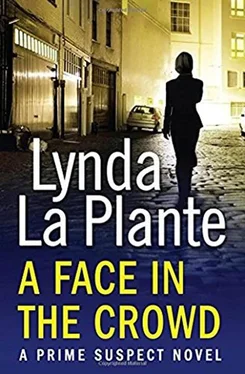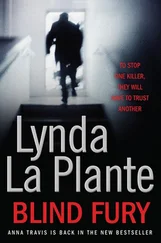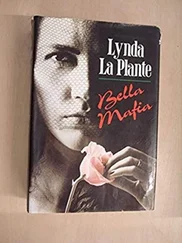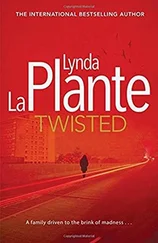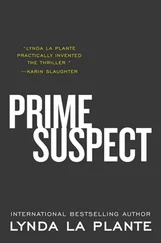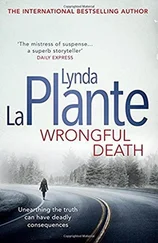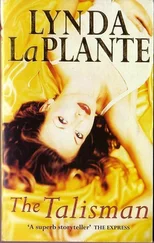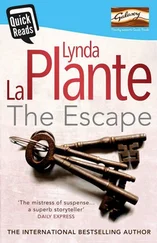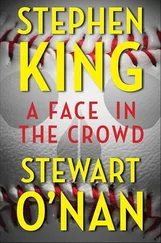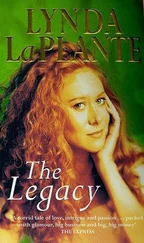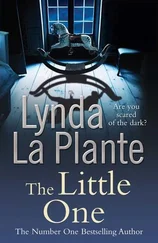Lynda La Plante - A Face in the Crowd
Здесь есть возможность читать онлайн «Lynda La Plante - A Face in the Crowd» весь текст электронной книги совершенно бесплатно (целиком полную версию без сокращений). В некоторых случаях можно слушать аудио, скачать через торрент в формате fb2 и присутствует краткое содержание. Жанр: Детектив, на английском языке. Описание произведения, (предисловие) а так же отзывы посетителей доступны на портале библиотеки ЛибКат.
- Название:A Face in the Crowd
- Автор:
- Жанр:
- Год:неизвестен
- ISBN:нет данных
- Рейтинг книги:5 / 5. Голосов: 1
-
Избранное:Добавить в избранное
- Отзывы:
-
Ваша оценка:
- 100
- 1
- 2
- 3
- 4
- 5
A Face in the Crowd: краткое содержание, описание и аннотация
Предлагаем к чтению аннотацию, описание, краткое содержание или предисловие (зависит от того, что написал сам автор книги «A Face in the Crowd»). Если вы не нашли необходимую информацию о книге — напишите в комментариях, мы постараемся отыскать её.
A Face in the Crowd — читать онлайн бесплатно полную книгу (весь текст) целиком
Ниже представлен текст книги, разбитый по страницам. Система сохранения места последней прочитанной страницы, позволяет с удобством читать онлайн бесплатно книгу «A Face in the Crowd», без необходимости каждый раз заново искать на чём Вы остановились. Поставьте закладку, и сможете в любой момент перейти на страницу, на которой закончили чтение.
Интервал:
Закладка:
Vernon became still, the scissors poised in his hand. His son was on TV. His Tony. It was the local news, and there was a small picture of him in the corner of the screen, above the announcer’s left shoulder.
“… twenty-two-year-old Anthony Allen, who is at the center of an internal police inquiry into the running of that station. Detective Superintendent Mike Kernan today issued the following statement, after the news was announced that the coroner’s inquest into the death would start tomorrow.”
Sarah couldn’t stand it anymore. She had to leave him, unable to bear the glazed, obsessive expression on her father’s face. The picture switched to Kernan outside Southampton Row.
“I’m very pleased that the inquest opening tomorrow comes so promptly after this tragic event. I am confident that the verdict will fully vindicate the police…”
In the darkened, flickering room Vernon stared at the screen, his cheeks wet with tears. He didn’t realize he had any left to shed.
The train rattled past, briefly illuminating the figure crouched beside the track. As soon as it had disappeared around the curve, Jason skipped nimbly over the tracks and went down the opposite embankment. He stopped halfway, partially concealed behind some bushes, almost level with the bedroom window of the house that backed onto the railroad. The light was on and the curtains hadn’t been drawn.
Sarah Allen entered the bedroom. She was wrapped in a large bath towel, a smaller towel around her head. She took down a suit that was hanging from the closet door and removed the plastic cover; the suit had just been dry cleaned. She held it up to the light for inspection, and hung it back on the closet door.
Jason unzipped his Windbreaker. He reached inside for the Pentax Z10 that was slung around his neck. The camera had three-speed power zoom with auto-focus and automatic wind/rewind. He clicked it on and checked the LCD display for battery level. Then he was ready.
Sarah unwrapped the large bath towel and let it fall. No need to draw the curtains, when the rear of the house wasn’t overlooked. She removed the towel from around her head and began to dry her hair.
Grinning, Jason put his eye to the viewfinder and pressed the shutter.
The death of Tony Allen in police custody was a hot story, and the press and TV were there in force, milling about on the steps of the Coroner’s Court. Jonathan Phelps never missed an opportunity, and he was keen to make an early statement, announcing that he personally had secured the services of a top attorney, Mrs. Elizabeth Duhra, to represent the Allen family.
It was just as well he got in quick. The arrival of Tony’s fiancée Esta with their daughter Cleo stole his thunder. This was the shot the media wanted, and they closed in, jostling and elbowing each other aside as she stepped out of the cab with Cleo in her arms. Esta pushed through and struggled up the steps, a barrage of flashes dazzling her and frightening the little girl. Gratefully she accepted the help of an usher, who came to her rescue and led her inside, from pandemonium to relative peace and calm. And the ordeal hadn’t yet begun.
Oswalde sat with Burkin and Calder on the witnesses’ bench. To his left he could see Tennison, talking quietly with Superintendent Kernan. Oswalde’s eyes swept around the packed court, then he bowed his head and stared at the floor. He couldn’t look at the Allen family. Vernon’s arm was clasped around his wife’s shoulder; she looked to be in a state of shock. Not even crying, just blank-eyed, drugged to the point where she hardly knew what was going on or whether it was actually happening.
Sarah was sitting with Esta, Cleo between them. Sarah was staring at Oswalde, and even though he kept his eyes on the floor, he could feel the force of her emotion, like a wave of hatred sweeping over him. No mercy there, and it didn’t surprise him, when he had none for himself.
The coroner was anxious to get the proceedings started. He waited while the court official called for silence, and then began by addressing the jury. His voice was brisk, neutral, cleansed of all nuance or feeling.
“No one is on trial. We are not investigating a crime, but a death. It is our job-yours and mine-to decide how Anthony Allen came to die in police custody. One word of warning. You may be asked to study some distressing photographs taken both at the time of the young man’s death and at the autopsy. I consider the viewing of these pictures to be vital as an aid to reaching your decision. We will begin today by hearing from the pathologist, Professor Bream.”
Bream was on the stand less than ten minutes. He stated the cause of death, from asphyxiation, and answered one or two questions from the coroner. Custody Sergeant Calder was then called to the stand. He swore the oath, and knew he was in for a tough time immediately when Mrs. Duhra started questioning him. She was a slim, elegant, dark-haired woman with high cheekbones and quick, intelligent eyes; a member of a prominent Anglo-Indian family, most of whom were in the legal profession.
Calder wasn’t sure that she was deliberately playing to the largely black public gallery, but she didn’t seem to mind their occasional shouts and angry interruptions.
“It must have taken a great deal of force, and determination, to strangle himself in such a manner.” Mrs. Duhra tilted her head a fraction, inviting his agreement. “Wouldn’t you say?”
As procedure demanded, and as he had been taught, Calder directed his replies to the coroner.
“I don’t know about that.”
“Professor Bream thought so. He thought Tony Allen may have taken rather a long time to die.” She glanced down at some papers, and looked up again. “You did make your checks every fifteen minutes, didn’t you?”
Calder gazed straight in front of him, the globed lights reflecting on his bald head. “Thirty minutes, sir.”
“Oh yes…” Mrs. Duhra nodded. Her lips thinned. “Because it’s checks every fifteen minutes for prisoners at risk. And, of course, you’d decided that Tony Allen wasn’t at risk, hadn’t you?”
“Mrs. Duhra,” the coroner mildly rebuked her. She was making assumptions about Calder’s judgment at the time without any supporting testimony to that effect.
“Why was the flap left open?” Mrs. Duhra asked.
“Because the prisoner requested it to be left open, sir.”
“Why?”
“To let in some fresh air.”
“Because he couldn’t breathe… because he was claustrophobic?”
“I don’t know about that, sir.”
“No, I don’t suppose you do,” Mrs. Duhra said, though her tone implied that any person with half a brain ought to have known. “If, as you say, he refused the offer of a lawyer-”
“He did, sir.” Calder wanted that on the record.
“-why did you not make sure that some responsible adult was with him? His father, for example, who was in reception almost the whole time?”
“Because there was no need.”
Mrs. Duhra frowned, giving him a quizzical look that was more for the benefit of the jury. “But his mental health was of concern to you, was it not?”
“No, sir,” Calder said stolidly. “It was not.”
This reply seemed to puzzle Mrs. Duhra even more. She consulted her papers. “But as we can see from the custody record, you called a doctor at nine fifteen p.m.” She glanced up, waiting.
“Yes,” Calder admitted. He’d forgotten about procedure, addressing his reply directly to her.
“So you must have been concerned,” Mrs. Duhra went on, logically proving her point. “But he didn’t arrive, did he? Until after one a.m. Didn’t you think to call another doctor?”
Calder’s mind went blank. He said in a rush, “I was busy.”
Читать дальшеИнтервал:
Закладка:
Похожие книги на «A Face in the Crowd»
Представляем Вашему вниманию похожие книги на «A Face in the Crowd» списком для выбора. Мы отобрали схожую по названию и смыслу литературу в надежде предоставить читателям больше вариантов отыскать новые, интересные, ещё непрочитанные произведения.
Обсуждение, отзывы о книге «A Face in the Crowd» и просто собственные мнения читателей. Оставьте ваши комментарии, напишите, что Вы думаете о произведении, его смысле или главных героях. Укажите что конкретно понравилось, а что нет, и почему Вы так считаете.
